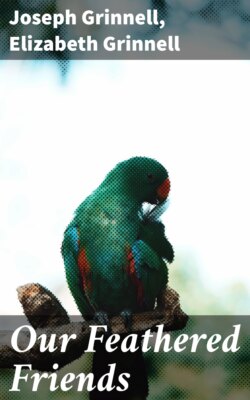Читать книгу Our Feathered Friends - Grinnell Joseph - Страница 5
На сайте Литреса книга снята с продажи.
CHAPTER I.
ОглавлениеTable of Contents
THE MESSAGE OF A MOCKING-BIRD.
It was in the year 1877, before any of the children who read this book were born. We were living on one of the great reservations in the Indian Territory. Some one knocked at the door. When the door was opened, there stood a little Indian girl, her head all covered up in a bright shawl. She was shy, as Indian girls were before they had seen many white people. Very timidly she drew her hand from under her shawl and gave to us a baby mocking-bird. Then she turned and ran down the prairie toward her buffalo-skin lodge not far away.
We understood. The little girl's name was Kitty-ka-tat. She had been to our house often. She knew that we liked pets of all kinds, and birds most of all, so she had captured this one for us by a kind of snare or trap. Of course we kept it, for we did not know where its nest was. We allowed it to use the whole house for a cage. It ate wherever we ate, and slept at night on the curtain pole above the window.
Mocking-bird.
But the perch it liked best by day was the top of its master's head. As soon as this gentleman came in and sat down in the rocking-chair and put on his skullcap, the bird would fly to his shoulder. Sometimes it would take a nip at his ear or his hair. Then it would give a hop and a flutter, and land in the middle of the black skullcap, where it would sit for an hour if no one disturbed it. It liked to take crumbs from our hands, or bits of apple from our lips, standing on our shoulders. It bathed every day in a large pan of water placed in the middle of the carpet. Then, too wet to fly farther, it would flutter all dripping to a low stool, where it would dry its clothes after the wash. If a door chanced to be left open, the bird would fly to the top of it and preen its feathers and look about at us below in a very pretty way. So you see the little thing really washed and dried and ironed its clothes.
One day when it was perched on the top of the hall door, as happy as could be, a gust of wind quickly blew the door shut, with a loud noise. The bird gave a sharp scream and flew to the window. We looked and saw a strange sight,—a mocking-bird without a tail.
The little bundle of feathers had been shut in at the top of the door when the wind closed it; and there sat poor birdie, a mere chunk of a darling, turning its head from side to side and looking sadly back at the place where its tail had once been.
We opened the door, and down fluttered every one of the beautiful feathers. Birdie eyed them with a puzzled look, canting its head, as though it were saying, "I don't understand it at all." Then it looked backward again in a very pitiful way. We couldn't help laughing, though we were so sorry for the bird. In a short time the feathers grew again, and the little fellow showed great care in preening them and placing them just as it thought they ought to grow.
After a while there came to be a little baby in the house, and the mocking-bird seemed to understand. Two grown-up people had been its only friends before, but it was never afraid of the stranger baby from the first time it saw him. It would fly from any perch to where the baby lay and peep into the baby's face in the sweetest way, as if saying, "Glad to see you, little man." Then it would twitter a low song, which sounded very much as if it were singing, "Little one, when you grow up, be kind to the birds and love them."
The Young Mocking-Bird
that lost its Tail in the Door.
"Be kind to the birds and love them" was the little mocking-bird's message, or so it seemed to us.
The baby and his mother never forgot the message of the mocking-bird. They have loved birds ever since. That is why they are writing this book about birds for the children.
